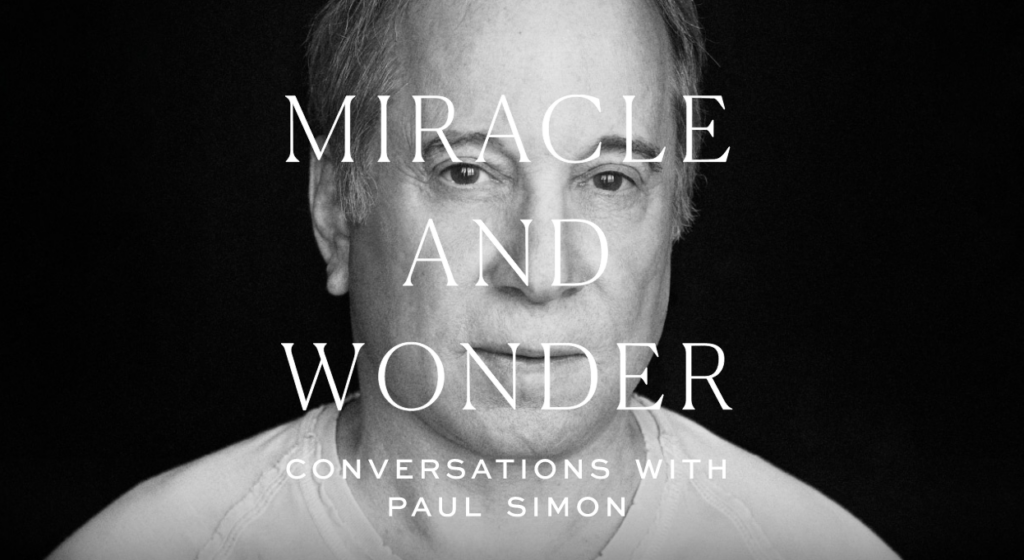Malcolm Gladwell on Paul Simon

Malcolm Gladwell is creating an exclusive audiobook from interviews with Paul Simon. It’s called “Miracle and Wonder.”
And I have to admit I am pretty excited about this.
Paul Simon’s talent
In my opinion, Paul Simon is the foremost poet of the Twentieth Century.
His ability to connect melody, rhyme, and meaning is without parallel. His songs get at fundamental truths about human beings in ways that aren’t direct, but hit you all at once in the head and in the heart.
I was introduced to Simon and Garfunkel by my parents. We played “Bookends” over and over. But anyone who listens knows that while Garfunkel had a beautiful voice and the two of them harmonized incredibly, Simon is the one who created the songs.
His solo career is filled with albums that go in unusual directions — gospel, world music, Caribbean — and still manage to connect with the throbbing musical organ that somehow resides in all of our brains. This is not folk or pop or anything other than just music that connects.
His music since 1990’s “Rhythm of the Saints” hasn’t been quite as good. But that matters very little — by then he’d created an opus that is enough to live on for a long time.
I’m not a music guy. My tastes are stuck in the past. But I’m a Paul Simon guy.
Malcolm Gladwell’s talent
Malcolm Gladwell makes unusual connections and strings them together into compelling stories. I am in awe of his ability to write nonfiction stories. There is more than a little jealousy here. (We once appeared together at a small event. I gave a substantive research-heavy speech with jokes. He rambled. But the high-level audience — CMOs from a major media company — were a lot more willing to believe him than me.)
Gladwell connects dots in ways that are unusual. They’re sometimes wrong, too. But he is a master storyteller.
I’ve listened to several of his audiobooks. He reads them himself, but in the most recent ones, he also interpolates actual interview audio and sometimes, music. It’s a new art form. I wouldn’t say he’s mastered it, but it’s certainly intriguing.
What I’m looking forward to
I’ve read Robert Hilburn’s 2019 biography of Paul Simon. It’s not like there is all that much about his life that’s not already been said. I don’t expect to learn anything new about how he got here.
But Gladwell asks interesting questions. He may be able to teach us something about how Simon’s brain works that we didn’t know before. He may be able to help untangle the connection between emotion and music and logic and lyric in a way we didn’t suspect. Gladwell and Simon are both wordsmiths, albeit of different types. I am intrigued to see what happens when they interact.
This could be a huge disappointment. But that’s always the risk with things like this.
Here are some Simon lyrics you may not be as familiar with, that somehow seem relevant.
The boy’s got a voice
But the voice is his natural disguise
Yes the boy’s got a voice
But his words don’t connect to his eyes
He says, “Ah, but when I sing
I can hear the truth auditioning”
The boy’s got a voice
But the voice is his natural . . .Oh, Marion
“Oh, Marion” (One Trick Pony)
I think I’m in trouble here
I should’ve believed you
When I heard you saying it
The only time
That love is an easy game
Is when two other people
Are playing it
The smartest people in the world
Had gathered in Los Angeles
To analyze our love affair
And possibly unscramble us
And as we sat among our photographs
Examined every one
And in the end, we compromised
And met the morning sunMaybe I think too much
“Think Too Much” (Hearts and Bones)
Maybe I think too much
Oh, maybe I think too much
Maybe I think too much
Not to deny Paul Simon’s songwriting talents, but to call him the foremost poet of the Twentieth Century is extreme. If we survey only the field of songwriters, your comment would exclude Leonard Cohen, Bob Dylan, John Lennon, and quite a few others.
I know what I know
I’ll sing what I said
We come and we go
That’s a thing that I keep
In the back of my head
– Paul Simon (and me)
I love your political views and your taste in music.
I think his “American Tune” should be our national anthem. (I’m learning it on piano.) I heard an interview with him where he said he sometimes starts writing by bouncing a tennis ball and trying to tell a story in rhyme to the rhythm, much like girls do when they are jumping rope. And to Darrell’s comment, I would add Joni Mitchell’s extensive body of work.
“American Tune” is a German tune. https://www.youtube.com/watch?v=kc6iIANFJQU
Didn’t you grow up listening to Kris Kristofferson? He certainly qualifies as a poetic genius also.
Sandy
I enjoyed this recently. ‘Sodajerker’ is a podcast by two songwriters who interview other songwriters
https://www.sodajerker.com/episode-88-paul-simon/
Thanks for this heads up. What a great idea for Gladwell. Looking forward to this, and hope he does more of them. As for “foremost poet”, okay, one of them….